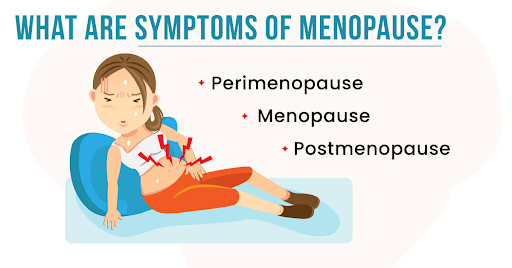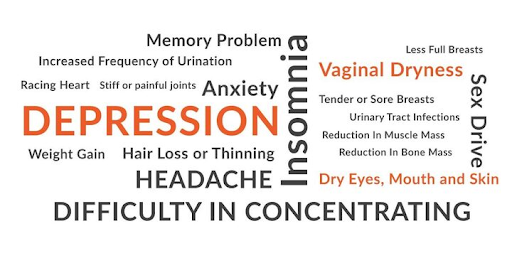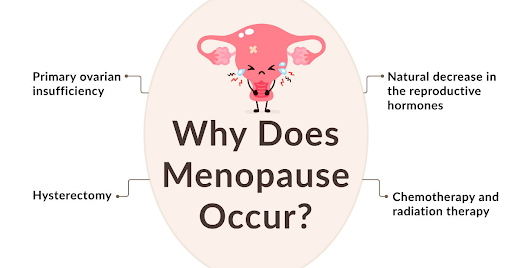
Menopause: Causes, Symptoms and Complications
What is menopause?
When the menstruation cycle does not take place for 12 consecutive months in a woman’s life and she can no longer become pregnant naturally, it is termed as menopause. The menstruation usually stops between the ages of 45 and 55. For most women menopause does not require any medical treatment, it happens naturally.
What are symptoms of menopause?
Menopause occurs differently in every woman. When menopause occurs suddenly the symptoms are more severe.
The menopause can be categorized into three stages:

- Perimenopause
- Menopause
- Postmenopause
Every stage has its own signs and symptoms. Some of the early signs of perimenopause are:
- Frequency of menstruation decreases
- Lighter or heavier periods that the regular experience
- Vasomotor symptoms that includes night sweats, flushing and hot flashes
Some of the other symptoms of menopause.

- Depression
- Anxiety
- Insomnia
- Difficulty in concentrating
- Weight gain
- Vaginal dryness
- Sex drive
- Memory problem
- Hair loss or thinning
- Dry eyes, mouth and skin
- Increased frequency of urination
- Tender or sore breasts
- Stiff or painful joints
- Racing heart
- Headache
- Urinary tract infections
- Reduction in muscle mass
- Reduction in bone mass
- Less full breasts
- Increase in the hair growth on various body parts such as the face, upper back, neck,and chest.
Why does menopause occur?
When the ovaries age and produce less reproductive hormones menopause occurs as a natural process. The levels of estrogen, progesterone, testosterone, Luteinizing hormone (LH), follicle-stimulating hormone (FSH) decreases and the body undergoes several changes due to it.
Menopause can be the result of:
- Natural decrease in the reproductive hormones
There is a decrease in the making of estrogen and progesterone as the females reach their late thirties. These are the hormones that are responsible for regulating menstruation and fertility and it declines with time. When females reach their forties their cycle becomes irregular, menstrual cycles become longer or shorter and heavier or lighter. But by the age of 51 the ovaries stop producing the eggs and that results in the menopause.
- Chemotherapy and radiation therapy
Chemotherapy and radiation therapy are used for the treatment of cancer patients. The hot flashes are the result of it and happens during or shortly after the cancer treatment. This has an impact on the menstruation cycle. In some cases menopause is permanent because of chemotherapy but in some menstruation starts again after a certain time.

- Hysterectomy
In hysterectomy the uterus is removed but ovaries are still there so it does not cause immediate menopause. In this situation even when you don’t have your periods, the ovaries still release eggs and produce estrogen and progesterone. But in cases where both the uterus and ovaries are removed it causes immediate menopause. Sudden stop of periods causes hot flashes and other symptoms. The symptoms can be severe too as it is a sudden change.
- Primary ovarian insufficiency
Some of the women face menopause even before the age of 40. It is because their ovaries are not able to release eggs every month. It may be due to genetic factors or autoimmune disease.
Some of the complications of menopause
Chances of certain diseases increase in women after menopause occurs. Some of them have been listed below:
- Cardiovascular disease
Chances to develop heart and cardiovascular diseases increases when the level of estrogen declines. One of the leading reasons for death in men and women is heart disease. If your cholesterol or blood pressure is high you should consult your doctor and get some advice to protect your heart. Maintain a healthy diet and lifestyle to maintain normal weight that can prevent from heart diseases.
- Weight gain
Weight gain is one of the problems faced by women who are going through menopausal transition and sometimes after menopause as it slows down the metabolism. The solution to it is eat leeds and workout more.
- Sexual function
Moisture production decreases, causing vaginal dryness and loss of elasticity can cause slight bleeding and the female may suffer from some discomfort during sexual intercourse. The sensation also decreases and can decrease the urge of sexual activities.
- Osteoporosis
Increased risk of fractures as the bones become weak and brittle. The bone density decreases at a rapid rate in the initial few years once menopause takes place and chances of osteoporosis increases. The fractures can take place majorly in the hips, spine, and wrists.
- Tags: menopause